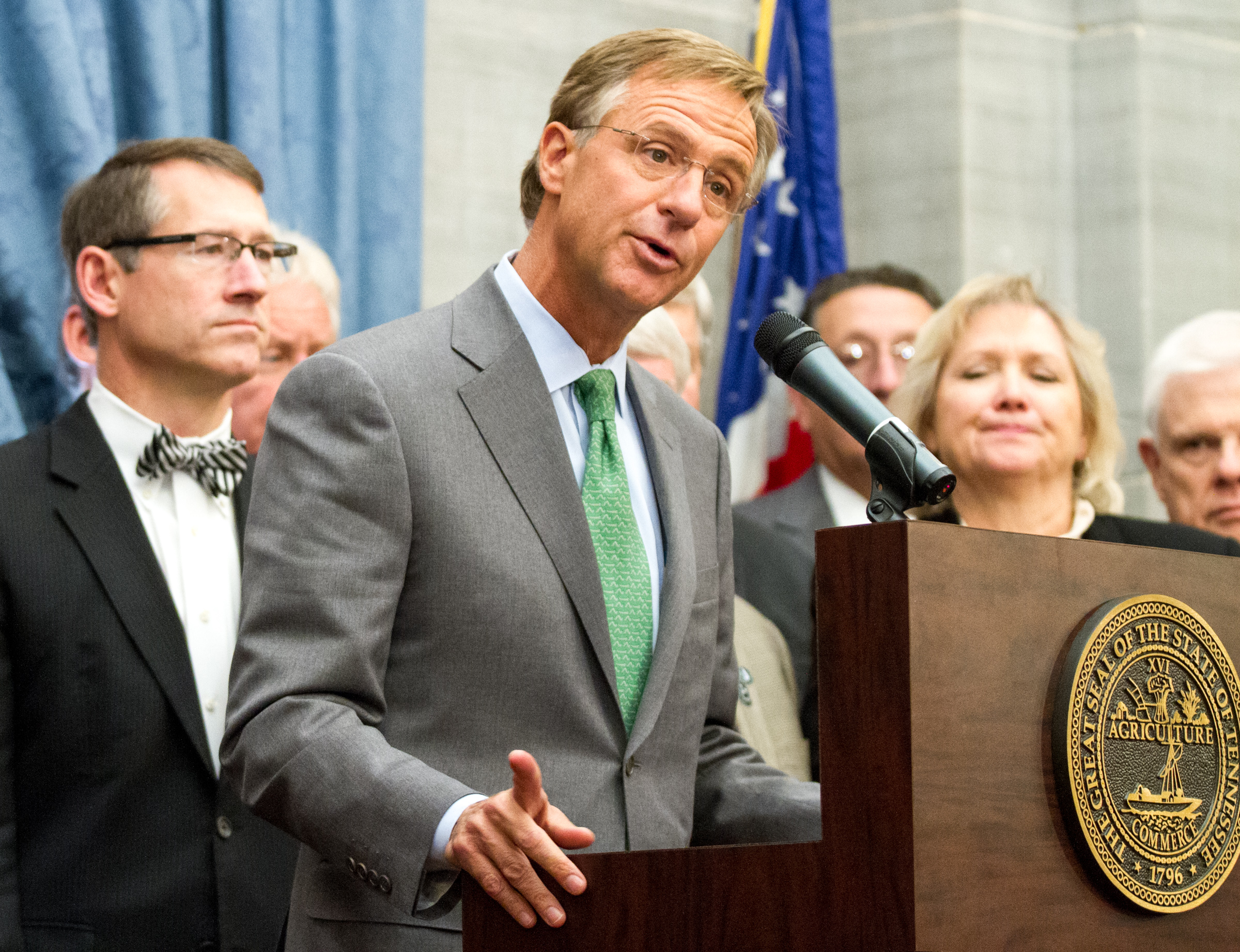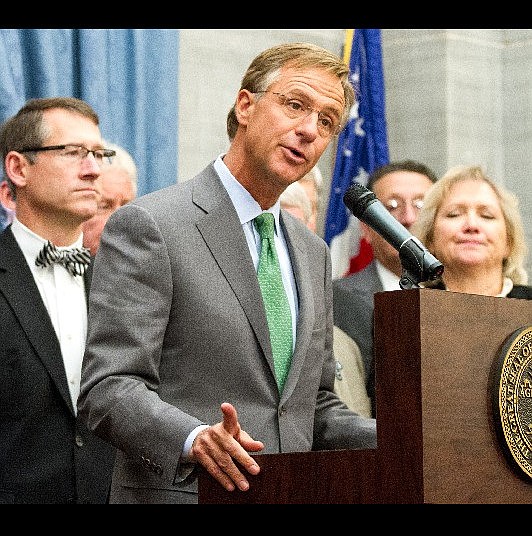 Gov. Bill Haslam announces a proposal to limit the sale of cold medications used to make methamphetamine during a news conference Thursday in Nashville. Under Haslam's plan, people could buy the equivalent of 10 days' worth of the maximum dose of products containing the meth precursors without a prescription each month. Pharmacists could allow another 10 days' worth, but anyone needed any more would have to get a doctor's prescription.
Gov. Bill Haslam announces a proposal to limit the sale of cold medications used to make methamphetamine during a news conference Thursday in Nashville. Under Haslam's plan, people could buy the equivalent of 10 days' worth of the maximum dose of products containing the meth precursors without a prescription each month. Pharmacists could allow another 10 days' worth, but anyone needed any more would have to get a doctor's prescription.NASHVILLE - Gov. Bill Haslam on Thursday staked out a middle ground on anti-methamphetamine measures, proposing a bill that requires a prescription to obtain more than a 20-day supply of cold remedies used to manufacture meth.
But he could face a fight from powerful drug manufacturers, who immediately objected that it would "burden law-abiding Tennesseans."
The Republican governor unveiled his proposal at a Capitol Hill news conference, flanked by 36 GOP lawmakers including Senate Speaker Ron Ramsey and House Speaker Beth Harwell. He hopes to navigate between those who want pseudoephedrine and ephedrine products made available only by prescription and those who support the current industry-backed law. That law limits prescriptions and puts buyers names into a national database.
Haslam said his intent is to zero in on illegal meth production derived from products like Sudafed without severely inconveniencing consumers.
"You've got to remember that 97 percent of people buying pseudoephedrine are buying it for legitimate reasons," Haslam said. "They're out there with real cold and sinus problems."
He said the goal is "targeting the so-called 'smurfers' who buy from a variety of stores in small quantities until they have enough to manufacture meth." The "smurfs" act on the behest of illegal meth makers.
Haslam said the average Tennessean bought only 4.8 grams of pseudoephedrine in all of 2012.
His plan would let consumers buy up to 2.4 grams per month, about 10 days worth of the maximum recommended dose, by just signing their names for the database. Pharmacists could allow them to buy another 10 days' worth. Beyond that, a doctor's prescription would be needed.
The Consumer Healthcare Products Association, a pharmaceutical manufacturers' trade group, issued a statement in which President and CEO Scott Melville, said the legislation "proposed today would burden law-abiding Tennesseans -- particularly those who suffer from frequent allergy symptoms -- with severe restrictions."
Melville called the proposal "tantamount to a prescription mandate" and said CHPA looks "forward to a healthy dialogue with the governor and Tennessee legislators to find an effective means to punish criminals, not law-abiding Tennesseans."
The governor's office said nearly 1,700 meth labs were busted in 2012 and 268 children were removed from homes where meth was a factor.
Haslam acknowledged his proposed restrictions won't completely eliminate smurfing.
"Will this make it harder? Yes. And we want to do what we can to make it hard," he said.
Ramsey, the Senate speaker, said meth has been a hard issue in his Northeast Tennessee area of Blountville. He likes Haslam's approach, saying prescription-only proposals would cause a consumer backlash.
"I think it would work until a mom's driving home from school one day, and her kid has a snotty nose and she stops in to buy some Sudafed, and that pharmacist says, 'By the way, you have to go to the doctor,'" Ramsey said.
Tennessee Bureau of Investigation Director Mark Gwyn joined Haslam and thanked him "for understanding and hearing the cry of law enforcement, who for many years have been drowning under this scourge of methamphetamine."
Tommy Farmer, director of the Tennessee Methamphetamine and Pharmaceutical Task Force, said the plan would "definitely" make meth cooks work harder.
He said many law officers would prefer a prescription mandate but called Haslam's plan a step in the right direction.
Baeteena Black, executive director of the Tennessee Pharmacists Association, said the group likes Haslam's approach.
But manufacturers are a powerful force on Tennessee's Capitol Hill. Local police chiefs have heavily criticized CHPA for blocking more meaningful restrictions in the Legislature.
According to state lobbyist filings, the group spent between $370,000 and $785,000 on lobbyists and lobbying-related expenses like public relations between May 5, 2009, and Aug. 6, 2013.
Asked if the governor of Tennessee is big enough to win a fight with "Big Pharma," Haslam laughed and said, "We'll see."
Staff writer Beth Burger contributed to this report.
Contact staff writer Andy Sher at asher@timesfreepress.com or 615-255-0550.
